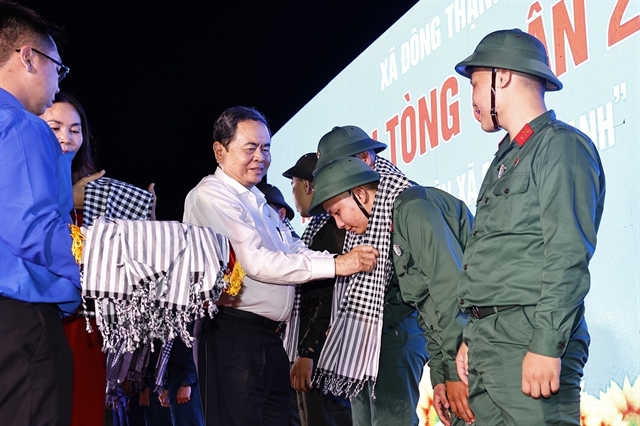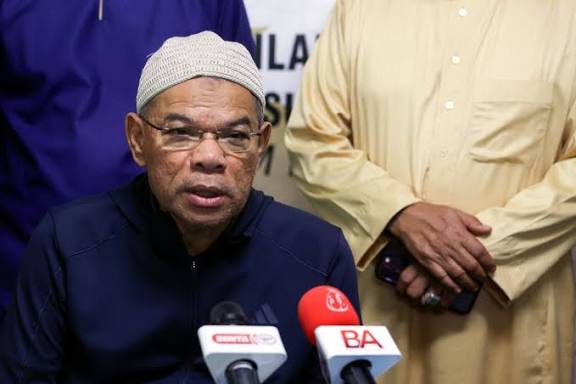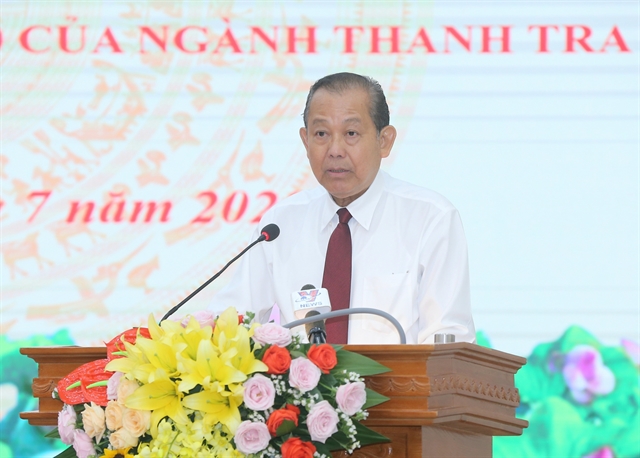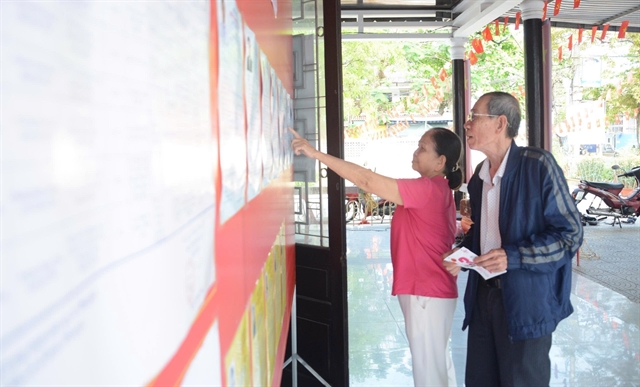 Society
Society


|
| Deputy Prime Minister Trương Hoà Bình addresses the meeting reviewing the Government Inspectorate performance in the first half of the year and its tasks for the second half. — VNA/VNS Photo Doãn Tấn |
HÀ NỘI — In the first half of this year, inspectors in Việt Nam found land violations valued at VNĐ31.149 trillion (US$1.35 billion) and covering 3,432ha after conducting 77,000 inspections, the Government Inspectorate of Việt Nam announced on Wednesday.
Of the inspections, as many as 3,245 were administrative inspections, a decrease of 8.7 per cent compared with the same period last year, while nearly 73,700 inspections were specialised, which were conducted in specific sectors or domains for the observance of specialised laws, professional-technical regulations and management rules of these sectors.
The number of specialised inspections fell 13 per cent compared with the same period last year.
The Government Inspectorate recommended revoking over VNĐ13.7 trillion ($600 million) and 507ha of land. Until now, nearly VNĐ4 trillion ($174 million) and 83ha of land has been revoked.
The inspectors also recommended giving administrative discipline to 805 groups and 12 individuals for involvement in the violations.
They recommended nearly 47,000 decisions to fine violators with total fines of VNĐ4.225 trillion.
Inspectors transferred documents relating to 41 cases and 46 suspects to investigative agencies.
According to the Government Inspectorate, in the last six months, administrative agencies at all levels nationwide received 165,198 visits by citizens who came to report nearly 134,300 issues. Of the visitors to the State’s administrative offices, there were 1,642 groups, a decrease of 16.4 per cent compared with the number of groups visiting the offices in the same period last year.
As many as 1,574 visitors and 156 groups of people went to the offices of the Central Party Committee and State in Hà Nội and HCM City.
Ministries and local governments in cities and provinces received 163,624 visits by citizens who raised nearly 133,000 issues of concern. The number of visitors fell 5 per cent and the issues increased 9.1 per cent compared with those of the same period last year.
The Ministry of Public Security, Việt Nam Social Security, Hà Nội People’s Committee, Quảng Ninh, Hà Nam, Hải Phòng, Hà Tĩnh, Thanh Hoá, HCM City and Sóc Trăng were among those receiving a large number of citizens.
Administrative agencies at all levels nationwide reportedly addressed over 9,900 complaints and denunciations from citizens, accounting for over 71 per cent of total complaints and denunciations.
The Government Inspectorate detected and reported eight cases to the Prime Minister.
Ministries, agencies and local authorities addressed nearly 10,000 cases out of nearly 13,900 complaints and denunciations.
The State Bank of Việt Nam, Ministry of Defence, Ministry of Justice, Hà Nội, Sơn La, Bình Định, Phú Yên, Thanh Hoá, Đồng Tháp and Hậu Giang were among units that did a good job in addressing citizens’ complaints and denunciations.
Thanks to the authorities’ intervention, VNĐ13 billion and 76ha of land was revoked and returned to the State budget and rightful owners.
Addressing the meeting on Wednesday of the Government Inspectorate to review its performance in the first half of this year, Deputy Prime Minister Trương Hoà Bình praised the inspectors’ efforts, especially during the COVID-19 pandemic. They effectively deployed information technology in conducting inspections.
“Inspectors’ work to handle citizens’ complaints and denunciations helps the fight against corruption, waste and keeps socio-political order,” Bình said.
However, in some cases, inspectors did not conduct prompt inspections or delayed announcing conclusions, he said, adding that some of their conclusions and recommendations to address violations were not as good as expected.
The Deputy PM called on the inspection sector to identify key contents, avoid overlaps with the State Audit and especially not cause trouble for firms’ production and operation.
Bình said that in the second half of this year, inspectors should focus on issues of land management, public asset purchasing, natural resources mining and anti-corruption.
“From now to the end of this year, unplanned inspections would not be expanded,” he said. — VNS




